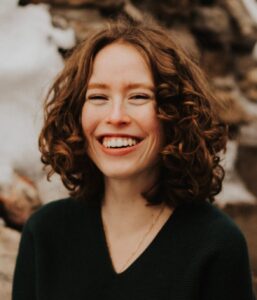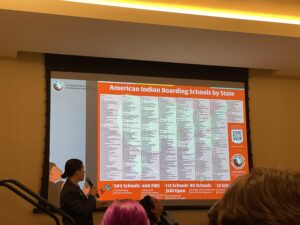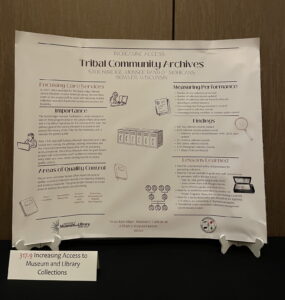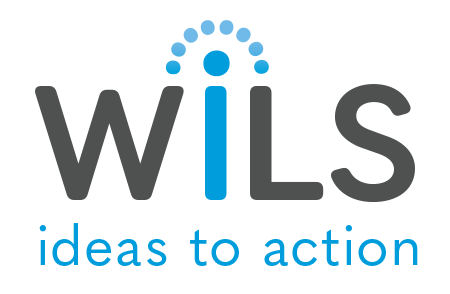
The Association of Tribal Archives, Libraries, and Museums (ATALM) held their annual international conference in October in Temecula, California, at the Pechanga Resort and Casino, and WiLS sent me, Kelsie Flack, the Curating Indigenous Digital Collections Fellow working with the Stockbridge-Munsee Community. WiLS also sent Sarah Lundquist, the first-year fellow who worked with the Ho-Chunk Nation, and we were able to connect and discuss our respective work in the Curating Indigenous Digital Collections project. Our work and participation in ATALM were all made possible through our grant from the National Endowment of Humanities (NEH). The conference was lively, informative, and full of incredible takeaways that are valuable to the work that WiLS and the Stockbridge-Munsee Community are pursuing.
The conference theme was “Intertwined Cultures: Stronger Together,” which encompassed the collaborative and diverse conversations that blossomed throughout the event. Individuals and professionals from around the world came together to share ideas, practices, and stories of the wonders of Indigenous cultural heritage and how it is handled in libraries, archives, and museums. A big topic of discussion was how technology has become integral to cultural heritage work and how it should be used to uplift and highlight the work of Tribal archives, libraries, and museums. It was useful to learn more about digital archival work, particularly for the project work that I am focusing on with Monique Tyndall, Director of Cultural Affairs for the Stockbridge-Munsee Community, whom I was lucky enough to meet in person for the first time at the conference!

I attended workshops and presentations on Indigenous intellectual property, data sovereignty, web archiving, the Native American Graves Protection and Repatriation Act (NAGPRA), Native American Boarding Schools, and Mukurtu. Each workshop was informative and important to the larger work that deals with Indigenous cultural heritage and the best practices that should be put in place to steward it. It was incredible to learn from and interact with such important and prominent scholars in the field, like Dr. Kim Christen (founder of Mukurtu and Local Contexts; co-director of Local Contexts; Chair & Professor of Digital Technology and Culture at Washington State University), Dr. Jane Anderson (founder and co-director of Local Contexts and Associate Professor of Anthropology and Museum Studies and a Global Fellow in the Engelberg Center for Innovation Law and Policy in the Law School at New York University), and Dr. Jennifer O’Neal (co-author of the Protocols for Native American Archival Materials and Assistant Professor in the Department of Indigenous, Race, and Ethnic Studies at the University of Oregon). It was surreal to meet these wonderful women and to hear from them that the work that WiLS and the Stockbridge-Munsee Community are embarking on is valuable to the greater landscape of Indigenous communities and cultural heritage work.

There were special presentations where Tribes and Tribal members were honored and awarded for their contributions to the field and to society as a whole. An Honoring Reception was held for the Top Ten Native Museums and Cultural Centers that served as models for the Culture Builds Communities Project. A luncheon was held to honor the Guardians of Culture and Lifeways International Awards, where nine honorees were allowed time to speak about their work and experiences. Joy Harjo, 23rd United States Poet Laureate and musician, and Billy Mills (Tamakoce TeHila), Olympic gold medalist and co-founder of Running Strong for American Indian Youth, were also celebrated with exciting events. There was also a market that ran during the conference where Native American artists and artisans sold their products and promoted their businesses.
Overall, my experience at ATALM was inspiring and educational, and I am so glad that I could attend such a monumental event filled with immeasurable resources. Thank you to WiLS for providing me with the opportunity to attend ATALM and to learn more about Indigenous cultural heritage through some of the most knowledgeable people on the topic!
